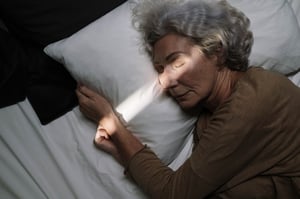Alzheimer's and dementia are two of the most common diseases that lead to reduced mental function...
7 Great Habits to Reduce the Risk of Alzheimer’s
It is estimated that Alzheimer's disease affects more than 5 million Americans and as many as 44 million people worldwide. It is a progressive brain disorder that gradually destroys memory, thinking skills, and the ability to carry out everyday tasks. While there is no cure for Alzheimer's, research has shown that there are certain habits and lifestyle changes that can help reduce the risk of developing the disease. In this blog post, we will explore seven great habits that can help you reduce the risk of Alzheimer's and keep your mind sharp as you age. Whether you are looking to prevent the onset of Alzheimer's or just want to maintain a healthy brain, these habits are a great place to start. So, let's get started!
7 Habits to Help Reduce the Risk of Alzheimer's!
-
Sleep
 Making sleep an important part of your habit regimen will help reduce the chances of getting Alzheimer's. Sleep helps to clear our brains of toxins that build up during the day. It helps with mood and mental health as well. One way to increase your chances of not getting Alzheimer's disease is by maintaining a regular sleep pattern. Studies show that people who maintain regular sleep patterns are up to 30% less likely to develop Alzheimer's.
Making sleep an important part of your habit regimen will help reduce the chances of getting Alzheimer's. Sleep helps to clear our brains of toxins that build up during the day. It helps with mood and mental health as well. One way to increase your chances of not getting Alzheimer's disease is by maintaining a regular sleep pattern. Studies show that people who maintain regular sleep patterns are up to 30% less likely to develop Alzheimer's.
Sleep helps clear our brains of toxins that are released during the day. It also helps with mood and mental health. Sleep deprivation can lead to an increased risk of depression or anxiety, resulting in increased stress and feelings of isolation, which can affect cognitive function and memory. To reduce your risk of Alzheimer's disease, make sleep a priority.
Create an environment that will promote good sleep habits, such as having blackout curtains or wearing earplugs if you're sensitive to noise. Establish a bedtime routine and turn off all electronics at least 30 minutes before going to bed in order for the brain to wind down. -
Exercise
Getting at least 30 minutes of exercise three times per week can help reduce the risk of Alzheimer's in many ways. It reduces stress, lowers blood pressure, and increases good cholesterol levels while improving memory function. Even if you don't have time to get 30 minutes of exercise every day, try to fit in some stretching or short walks. It is important if you want to reduce your risk of developing Alzheimer's disease.
It is not always easy to find 30 minutes per day in a busy week for exercise, but this is an important part of staying healthy. When it comes down to it, people who perform regular exercise are less likely to develop the disease than those who don't. -
Learn New Things
 Learning new things can help to reduce the risk of Alzheimer's disease. Studies have shown that people who continue to learn are less likely to develop this illness as they age because it helps them stay mentally active and socially engaged, which keeps their brains stimulated and healthy to maintain cognitive function for longer periods of time. Try learning a new language, a musical instrument, how to draw, or even consider taking a class at a local community center or school!
Learning new things can help to reduce the risk of Alzheimer's disease. Studies have shown that people who continue to learn are less likely to develop this illness as they age because it helps them stay mentally active and socially engaged, which keeps their brains stimulated and healthy to maintain cognitive function for longer periods of time. Try learning a new language, a musical instrument, how to draw, or even consider taking a class at a local community center or school! -
Reduce Stress
Do you feel tension in your head? Have you ever heard of people with Alzheimer's disease having a long history of stress throughout their lives? Well, they're not imagining it. Stress has been proven to cause damage on a cellular level, which may lead to symptoms like forgetfulness and mood swings. Luckily, there are simple ways for anyone who feels stressed out often or even just occasionally.
Get enough sleep at night by establishing regular bedtimes and turning off screens before going to bed. Also, take time every day for relaxation activities such as yoga, meditation, deep breathing exercises, or hot tea after breakfast. These can all help reset our bodies' natural balance between feeling relaxed and alert (or stressed). You owe yourself some downtime!
Click here to learn more about strategies to reduce stress! -
Socializing
 Socializing is a great way to reduce your risk of dementia. Studies have shown that socialization helps combat feelings of isolation, which can lead to the development of this condition. It has also been found to be one of the many factors in reducing your chances of developing Alzheimer's disease or dementia.
Socializing is a great way to reduce your risk of dementia. Studies have shown that socialization helps combat feelings of isolation, which can lead to the development of this condition. It has also been found to be one of the many factors in reducing your chances of developing Alzheimer's disease or dementia.
Socializing with others strengthens bonds between you and those around you. It also benefits everyone involved by decreasing depression rates, increasing happiness levels (which will help reduce stress), improving physical health due to an improved immune system resulting from exposure to bacteria and viruses, and more!
We all know that feeling when you're sitting in your house by yourself on a Saturday night. It's lonely, and it feels pointless to be alive or doing anything else besides watching TV alone and eating ice cream straight from the carton. Well, now there is good news for people like us!A recent study revealed socializing reduces dementia risk because isolation has been linked as a critical factor in developing memory loss later in life, but we don't have to go out every single day - just one hour per week can make an impact too!
-
Eat Healthily
 The benefits of eating healthy are endless and can lessen your chances of developing several diseases. One such disease is Alzheimer's, which has been linked to obesity, diabetes, high cholesterol levels, and lack of exercise combined with poor diet choices.
The benefits of eating healthy are endless and can lessen your chances of developing several diseases. One such disease is Alzheimer's, which has been linked to obesity, diabetes, high cholesterol levels, and lack of exercise combined with poor diet choices.
Alzheimer's has long been suspected of being caused by factors related to lifestyle. These include:-
Unhealthy food intake habits like overeating or the consumption of certain foods that lead to weight gain
-
Physical inactivity leading to metabolic syndrome or type 2 diabetes
-
Increased blood pressure due to excessive salt intake from processed foods
-
Inflammation resulting from chronic stress-induced cortisol release, also known as "the belly fat hormone"
-
Too much alcohol consumption causes liver damage, etc.
-
-
Don't smoke or drink alcohol excessively
 There is a direct correlation between smoking and drinking alcohol excessively and an increased risk of developing Alzheimer's. Though it is hard to say how much smoking and alcohol increase the risk, one thing we know is that these habits are not good for you. So stop smoking or drinking alcohol excessively, and you'll be on the right track. Click here to learn more about how to break bad habits!
There is a direct correlation between smoking and drinking alcohol excessively and an increased risk of developing Alzheimer's. Though it is hard to say how much smoking and alcohol increase the risk, one thing we know is that these habits are not good for you. So stop smoking or drinking alcohol excessively, and you'll be on the right track. Click here to learn more about how to break bad habits!
In conclusion, developing healthy habits and making lifestyle changes are essential in reducing the risk of Alzheimer's disease. Incorporating regular physical exercise, maintaining a healthy diet, staying socially active, challenging your brain with mental exercises, reducing stress, quitting smoking, and getting enough sleep can all play a significant role in reducing the risk of Alzheimer's and promoting brain health.







